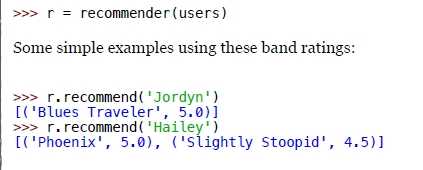标签:
主要内容:
1、k近邻
2、python实现
在入门-1中,简单地实现了基于用户协同过滤的最近邻算法,所谓最近邻,就是找到距离最近或最相似的用户,将他的物品推荐出来。
而这里,k近邻(K Nearest Neighbor)的意思就是,找出最近或最相似的k个用户,将他们的评分(相似度权重求和)最高的几个物品进行推荐。
代码中有两个数据集,
一个是直接写在的代码中的users;
一个是在BX-Books.csv文件中;(下载地址:http://www.guidetodatamining.com/assets/data/BX-Dump.zip)
运行方式:
数据集1:

数据集2:


import codecs from math import sqrt users = {"Angelica": {"Blues Traveler": 3.5, "Broken Bells": 2.0, "Norah Jones": 4.5, "Phoenix": 5.0, "Slightly Stoopid": 1.5, "The Strokes": 2.5, "Vampire Weekend": 2.0}, "Bill":{"Blues Traveler": 2.0, "Broken Bells": 3.5, "Deadmau5": 4.0, "Phoenix": 2.0, "Slightly Stoopid": 3.5, "Vampire Weekend": 3.0}, "Chan": {"Blues Traveler": 5.0, "Broken Bells": 1.0, "Deadmau5": 1.0, "Norah Jones": 3.0, "Phoenix": 5, "Slightly Stoopid": 1.0}, "Dan": {"Blues Traveler": 3.0, "Broken Bells": 4.0, "Deadmau5": 4.5, "Phoenix": 3.0, "Slightly Stoopid": 4.5, "The Strokes": 4.0, "Vampire Weekend": 2.0}, "Hailey": {"Broken Bells": 4.0, "Deadmau5": 1.0, "Norah Jones": 4.0, "The Strokes": 4.0, "Vampire Weekend": 1.0}, "Jordyn": {"Broken Bells": 4.5, "Deadmau5": 4.0, "Norah Jones": 5.0, "Phoenix": 5.0, "Slightly Stoopid": 4.5, "The Strokes": 4.0, "Vampire Weekend": 4.0}, "Sam": {"Blues Traveler": 5.0, "Broken Bells": 2.0, "Norah Jones": 3.0, "Phoenix": 5.0, "Slightly Stoopid": 4.0, "The Strokes": 5.0}, "Veronica": {"Blues Traveler": 3.0, "Norah Jones": 5.0, "Phoenix": 4.0, "Slightly Stoopid": 2.5, "The Strokes": 3.0} } class recommender: def __init__(self, data, k=1, metric=‘pearson‘, n=5): """ initialize recommender currently, if data is dictionary the recommender is initialized to it. For all other data types of data, no initialization occurs k is the k value for k nearest neighbor metric is which distance formula to use n is the maximum number of recommendations to make""" self.k = k self.n = n self.username2id = {} self.userid2name = {} self.productid2name = {} # for some reason I want to save the name of the metric self.metric = metric if self.metric == ‘pearson‘: self.fn = self.pearson # # if data is dictionary set recommender data to it # if type(data).__name__ == ‘dict‘: self.data = data def convertProductID2name(self, id): """Given product id number return product name""" if id in self.productid2name: return self.productid2name[id] else: return id def userRatings(self, id, n): """Return n top ratings for user with id""" print ("Ratings for " + self.userid2name[id]) ratings = self.data[id] print(len(ratings)) ratings = list(ratings.items()) ratings = [(self.convertProductID2name(k), v) for (k, v) in ratings] # finally sort and return ratings.sort(key=lambda artistTuple: artistTuple[1], reverse = True) ratings = ratings[:n] for rating in ratings: print("%s\t%i" % (rating[0], rating[1])) def loadBookDB(self, path=‘‘): """loads the BX book dataset. Path is where the BX files are located""" self.data = {} i = 0 # # First load book ratings into self.data # f = codecs.open(path + "BX-Book-Ratings.csv", ‘r‘, ‘utf8‘) for line in f: i += 1 #separate line into fields fields = line.split(‘;‘) user = fields[0].strip(‘"‘) book = fields[1].strip(‘"‘) rating = int(fields[2].strip().strip(‘"‘)) if user in self.data: currentRatings = self.data[user] else: currentRatings = {} currentRatings[book] = rating self.data[user] = currentRatings f.close() # # Now load books into self.productid2name # Books contains isbn, title, and author among other fields # f = codecs.open(path + "BX-Books.csv", ‘r‘, ‘utf8‘) for line in f: i += 1 #separate line into fields fields = line.split(‘;‘) isbn = fields[0].strip(‘"‘) title = fields[1].strip(‘"‘) author = fields[2].strip().strip(‘"‘) title = title + ‘ by ‘ + author self.productid2name[isbn] = title f.close() # # Now load user info into both self.userid2name and # self.username2id # f = codecs.open(path + "BX-Users.csv", ‘r‘, ‘utf8‘) for line in f: i += 1 #print(line) #separate line into fields fields = line.split(‘;‘) userid = fields[0].strip(‘"‘) location = fields[1].strip(‘"‘) if len(fields) > 3: age = fields[2].strip().strip(‘"‘) else: age = ‘NULL‘ if age != ‘NULL‘: value = location + ‘ (age: ‘ + age + ‘)‘ else: value = location self.userid2name[userid] = value self.username2id[location] = userid f.close() print(i) def pearson(self, rating1, rating2): sum_xy = 0 sum_x = 0 sum_y = 0 sum_x2 = 0 sum_y2 = 0 n = 0 for key in rating1: if key in rating2: n += 1 x = rating1[key] y = rating2[key] sum_xy += x * y sum_x += x sum_y += y sum_x2 += pow(x, 2) sum_y2 += pow(y, 2) if n == 0: return 0 # now compute denominator denominator = (sqrt(sum_x2 - pow(sum_x, 2) / n) * sqrt(sum_y2 - pow(sum_y, 2) / n)) if denominator == 0: return 0 else: return (sum_xy - (sum_x * sum_y) / n) / denominator def computeNearestNeighbor(self, username): """creates a sorted list of users based on their distance to username""" distances = [] for instance in self.data: if instance != username: distance = self.fn(self.data[username], self.data[instance]) distances.append((instance, distance)) # sort based on distance -- closest first distances.sort(key=lambda artistTuple: artistTuple[1], reverse=True) return distances def recommend(self, user): """Give list of recommendations""" recommendations = {} # first get list of users ordered by nearness nearest = self.computeNearestNeighbor(user) # # now get the ratings for the user # userRatings = self.data[user] # # determine the total distance totalDistance = 0.0 for i in range(self.k): totalDistance += nearest[i][1] # now iterate through the k nearest neighbors # accumulating their ratings for i in range(self.k): # compute slice of pie weight = nearest[i][1] / totalDistance # get the name of the person name = nearest[i][0] # get the ratings for this person neighborRatings = self.data[name] # get the name of the person # now find bands neighbor rated that user didn‘t for artist in neighborRatings: if not artist in userRatings: if artist not in recommendations: recommendations[artist] = (neighborRatings[artist] * weight) else: recommendations[artist] = (recommendations[artist] + neighborRatings[artist] * weight) # now make list from dictionary recommendations = list(recommendations.items()) recommendations = [(self.convertProductID2name(k), v) for (k, v) in recommendations] # finally sort and return recommendations.sort(key=lambda artistTuple: artistTuple[1], reverse = True) # Return the first n items return recommendations[:self.n]
标签:
原文地址:http://www.cnblogs.com/AndyJee/p/4852028.html